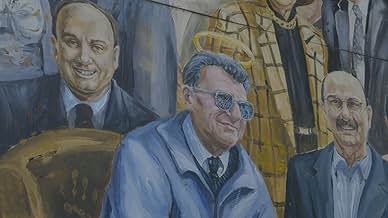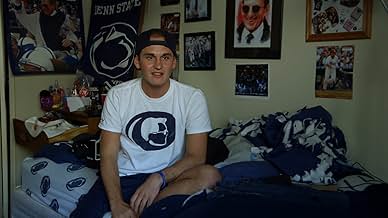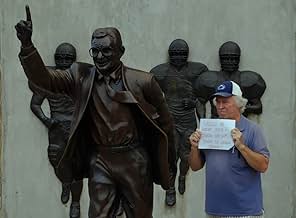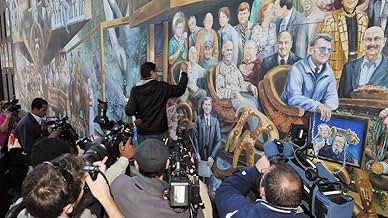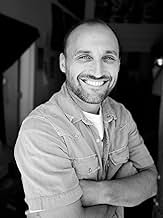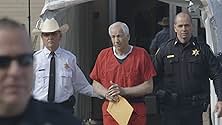AVALIAÇÃO DA IMDb
7,0/10
1,3 mil
SUA AVALIAÇÃO
Adicionar um enredo no seu idiomaA documentary that observes the year after Pennsylvania State University assistant football coach Jerry Sandusky's arrest on child sex-abuse charges.A documentary that observes the year after Pennsylvania State University assistant football coach Jerry Sandusky's arrest on child sex-abuse charges.A documentary that observes the year after Pennsylvania State University assistant football coach Jerry Sandusky's arrest on child sex-abuse charges.
- Direção
- Roteirista
- Artistas
- Prêmios
- 3 vitórias e 2 indicações no total
Joe Paterno
- Self - Football Coach, Penn State University
- (cenas de arquivo)
Jerry Sandusky
- Self - Former Football Coach
- (cenas de arquivo)
Dorothy Sandusky
- Self - Jerry Sandusky's Wife
- (cenas de arquivo)
Mark Emmert
- Self - NCAA President
- (cenas de arquivo)
James T. Clemente
- Self - Former FBI Agent and Profiler
- (cenas de arquivo)
Avaliações em destaque
Disclaimer: I have always had an appreciation for the Penn State football program. My mother was a Penn State fan (not an alumnus though), and she would always say that Joe Paterno represented class, while almost in the same breath denounce the legendary coach of my favorite college team, Barry Switzer as being anything but. Even though I am a loyal Sooners fan (though not an alumnus of OU, simply having been born in Oklahoma), I could appreciate what JoePa and Penn State stood for.
I couldn't help but think of that as I watched this documentary. In his lifetime Joe Paterno went from being a mere man into being a mythical one. It was one legend right after another, and I don't believe it matters who you are, if left unchecked, a person can buy into their own hype. I believe that happened with Joe Paterno, and it has left an impression on a program, a university, and a community struggling to make sense of it all. The whole truth may never fully be known.
From watching this I got the sense that Joe Paterno genuinely wanted to do the right thing. Having however the myth of "St. Joe", I believe he hindered himself from doing more because he couldn't believe a monster had gotten so close to him, and he couldn't live with what that would do to his perception. His son seemed to confirm as much as he stated both his parents were very well read, but naive about many other things surrounding them. Joe was too wrapped up in his own myth.
This documentary goes to great lengths to show how others have bought into the myth as well, and their support is as blind for him as it is deep. On the one hand they'll acknowledge what was done to the kids Jerry Sandusky was supposed to be helping was terrible. Just as quickly though they will try to absolve Paterno of any wrongdoing, saying he reported what he knew. In other words, the bare minimum. For a man that had built a reputation of going above and beyond the bare minimum, this seems to me, unacceptable. Yet they don't see it.
However, the lasting impression I got from watching this, and honestly I believe this was the point of the documentary, was that there is no prototypical child abuser, and that it is possible to dupe many into thinking one thing about you when something else may be the reality. That's a sobering thought for anyone.
The line that sums up this documentary for me though is quote "You should never build statues for guys who are still alive." True character is revealed when nobody else is looking. We may think we know someone, even if only by reputation. That reputation however may be little more than a house of cards ready to fall. In the end, regardless of what Joe Paterno knew or didn't know, what he reported or didn't report, the carefully crafted myth has come crashing down.
I couldn't help but think of that as I watched this documentary. In his lifetime Joe Paterno went from being a mere man into being a mythical one. It was one legend right after another, and I don't believe it matters who you are, if left unchecked, a person can buy into their own hype. I believe that happened with Joe Paterno, and it has left an impression on a program, a university, and a community struggling to make sense of it all. The whole truth may never fully be known.
From watching this I got the sense that Joe Paterno genuinely wanted to do the right thing. Having however the myth of "St. Joe", I believe he hindered himself from doing more because he couldn't believe a monster had gotten so close to him, and he couldn't live with what that would do to his perception. His son seemed to confirm as much as he stated both his parents were very well read, but naive about many other things surrounding them. Joe was too wrapped up in his own myth.
This documentary goes to great lengths to show how others have bought into the myth as well, and their support is as blind for him as it is deep. On the one hand they'll acknowledge what was done to the kids Jerry Sandusky was supposed to be helping was terrible. Just as quickly though they will try to absolve Paterno of any wrongdoing, saying he reported what he knew. In other words, the bare minimum. For a man that had built a reputation of going above and beyond the bare minimum, this seems to me, unacceptable. Yet they don't see it.
However, the lasting impression I got from watching this, and honestly I believe this was the point of the documentary, was that there is no prototypical child abuser, and that it is possible to dupe many into thinking one thing about you when something else may be the reality. That's a sobering thought for anyone.
The line that sums up this documentary for me though is quote "You should never build statues for guys who are still alive." True character is revealed when nobody else is looking. We may think we know someone, even if only by reputation. That reputation however may be little more than a house of cards ready to fall. In the end, regardless of what Joe Paterno knew or didn't know, what he reported or didn't report, the carefully crafted myth has come crashing down.
A well done documentary about how people react when the people and things they believe in turn out to be an illusion. Being from the 'liberal west coast', I've never understood how football could possibly reach the level of reverence it enjoys elsewhere. But here it is in all its glory... supported by hoards who seem more concerned with sportsball than anything else in their lives -- including justice for abused kids. Well okay, maybe they care for the kids as long as the football games don't stop and no one attacks their coach. For without football, we are nothing.
In all fairness, the documentary did include representatives from the non-reverent point of view. But it's witnessing the reactions of people who have so much invested in a sport that has achieved cult status, as well as the mechanics of group think, that make this an interesting doc. A good study in the sort of self-righteous mentality that starts wars. But who am I judge? I'm a west coast liberal. I'd rather do almost anything else than watch football.
In all fairness, the documentary did include representatives from the non-reverent point of view. But it's witnessing the reactions of people who have so much invested in a sport that has achieved cult status, as well as the mechanics of group think, that make this an interesting doc. A good study in the sort of self-righteous mentality that starts wars. But who am I judge? I'm a west coast liberal. I'd rather do almost anything else than watch football.
An excellent documentary about how a college and it's football sycophants had to eventually grow up. What happened to Sandusky and Paterno was exactly what should've happened.
The only sad part is that Paterno died not really seeing his true fall from favor. Those that commit evil and those who do nothing to stop it are equally at fault.
Football is mindless nonsense. Perhaps in the end the students of Penn State finally actually learned something.
Bravo.
The only sad part is that Paterno died not really seeing his true fall from favor. Those that commit evil and those who do nothing to stop it are equally at fault.
Football is mindless nonsense. Perhaps in the end the students of Penn State finally actually learned something.
Bravo.
"St. Joe": What Penn State, College Station, and the world called Joe Paterno before the Jerry Sandusky indictment.
No one ever called my town, Columbus, "Happy Valley," but when Ohio State defeats Michigan, it's a happy valley indeed. That euphoria over a football program as successful as Penn State under head coach Joe Paterno with its spell cast so widely is the engine that drives a community to miss the signs of crime such as assistant coach Jerry Sandusky's abuse of young boys.
Amir Bar-Lev's documentary, Happy Valley, covers the historical bases of Sandusky's conviction on multiple counts and Paterno's eventual firing (and death a few months later) for not doing more to bring justice for the abused boys. Even Sandusky's adopted son, Matt, who is the most talking head in the doc, waits until boys have testified against Sandusky to confess he lied—he was abused.
That confession is at the heart of this slowly competent documentary, for it encapsulates the ambivalence of a community so mesmerized by football and its cast of characters that it takes a while to acknowledge some of the actors have feet of clay. Sandusky is easy—he was seen in the showers with boys—but Paterno, the beatified coach (the statue on campus is now gone, as if he were Hussein or Stalin), challenges their understanding of a morality that extends beyond just legally telling a superior about an incident, as Paterno did.
Bar-Lev's is as even-handed as could be: the media is held up to harsh light with its aggressive, predatory pursuit of the sensational; the NCAA is never fair enough; and the University, from president on down, can't get it just right.
And so it goes—this well done doc, despite the sometimes vacant talking heads, shows few participants not caught up in the hoopla. It sure makes me think Ohio State's Jim Tressel dust up was just a skirmish in an enduring battle for the hearts and souls of students and the communities where they live.
No one ever called my town, Columbus, "Happy Valley," but when Ohio State defeats Michigan, it's a happy valley indeed. That euphoria over a football program as successful as Penn State under head coach Joe Paterno with its spell cast so widely is the engine that drives a community to miss the signs of crime such as assistant coach Jerry Sandusky's abuse of young boys.
Amir Bar-Lev's documentary, Happy Valley, covers the historical bases of Sandusky's conviction on multiple counts and Paterno's eventual firing (and death a few months later) for not doing more to bring justice for the abused boys. Even Sandusky's adopted son, Matt, who is the most talking head in the doc, waits until boys have testified against Sandusky to confess he lied—he was abused.
That confession is at the heart of this slowly competent documentary, for it encapsulates the ambivalence of a community so mesmerized by football and its cast of characters that it takes a while to acknowledge some of the actors have feet of clay. Sandusky is easy—he was seen in the showers with boys—but Paterno, the beatified coach (the statue on campus is now gone, as if he were Hussein or Stalin), challenges their understanding of a morality that extends beyond just legally telling a superior about an incident, as Paterno did.
Bar-Lev's is as even-handed as could be: the media is held up to harsh light with its aggressive, predatory pursuit of the sensational; the NCAA is never fair enough; and the University, from president on down, can't get it just right.
And so it goes—this well done doc, despite the sometimes vacant talking heads, shows few participants not caught up in the hoopla. It sure makes me think Ohio State's Jim Tressel dust up was just a skirmish in an enduring battle for the hearts and souls of students and the communities where they live.
10medguy42
I liked this documentary very much. Watching people involved in the unchecked crimes of Jerry Sandusky give their side of the story was much more revealing than reading quotes. Matt Sandusky, Jerry's adopted son, impressed me as thoughtful and sincere. He did his best to be fair to Sandusky, saying that ninety percent of the time he spent with the man was everything a kid would want--association with fame, access to football games, etc.--but the other ten percent "would destroy you."
I was shocked when Matt, at the end of the film, said that not one single person from the Sandusky family contacted him after he went public about how Jerry molested him. What kind of people are Dottie and her relatives? If they didn't believe him, you would think someone might want to talk with him and ask him to take back his "lies." But no. That didn't happen.
The one thing missing from "Happy Valley" was any mention of the well-known fact that Paterno decided that some of his players who broke into a residence and beat people should not be put into the legal system. Paterno clearly believed that he and his players were above the law. He decided the law-breaking players would clean up the stadium after some games. It's also known that then-President Spanier and other higher-ups in the Athletics Dept. all agreed that Paterno was in charge of things like this. This piece of history is a big deal. It should have been in the documentary.
The behavior of some of the residents of Happy Valley was detestable. There's an extended scene in which these idiots don't hesitate to grab a sign from an older man making his negative view of Paterno known at the statue of the coach. A woman who wants a selfie with the statue pushes the man aside with her body. Others get in his face with red-neck-type logic. It's scary to see how conformist the community could be---all worshiping a football program.
This film had to be made, and it was made well.
I was shocked when Matt, at the end of the film, said that not one single person from the Sandusky family contacted him after he went public about how Jerry molested him. What kind of people are Dottie and her relatives? If they didn't believe him, you would think someone might want to talk with him and ask him to take back his "lies." But no. That didn't happen.
The one thing missing from "Happy Valley" was any mention of the well-known fact that Paterno decided that some of his players who broke into a residence and beat people should not be put into the legal system. Paterno clearly believed that he and his players were above the law. He decided the law-breaking players would clean up the stadium after some games. It's also known that then-President Spanier and other higher-ups in the Athletics Dept. all agreed that Paterno was in charge of things like this. This piece of history is a big deal. It should have been in the documentary.
The behavior of some of the residents of Happy Valley was detestable. There's an extended scene in which these idiots don't hesitate to grab a sign from an older man making his negative view of Paterno known at the statue of the coach. A woman who wants a selfie with the statue pushes the man aside with her body. Others get in his face with red-neck-type logic. It's scary to see how conformist the community could be---all worshiping a football program.
This film had to be made, and it was made well.
Você sabia?
- Citações
Self - Football Coach, Penn State University: Beacon of integrity is kinda scary.
- ConexõesFeatured in Cameraperson (2016)
Principais escolhas
Faça login para avaliar e ver a lista de recomendações personalizadas
- How long is Happy Valley?Fornecido pela Alexa
Detalhes
- Data de lançamento
- País de origem
- Centrais de atendimento oficiais
- Idioma
- Também conhecido como
- Χαρούμενη κοιλάδα
- Empresas de produção
- Consulte mais créditos da empresa na IMDbPro
Bilheteria
- Faturamento bruto nos EUA e Canadá
- US$ 23.868
- Fim de semana de estreia nos EUA e Canadá
- US$ 9.047
- 23 de nov. de 2014
- Faturamento bruto mundial
- US$ 23.868
- Tempo de duração
- 1 h 38 min(98 min)
- Cor
Contribua para esta página
Sugerir uma alteração ou adicionar conteúdo ausente



